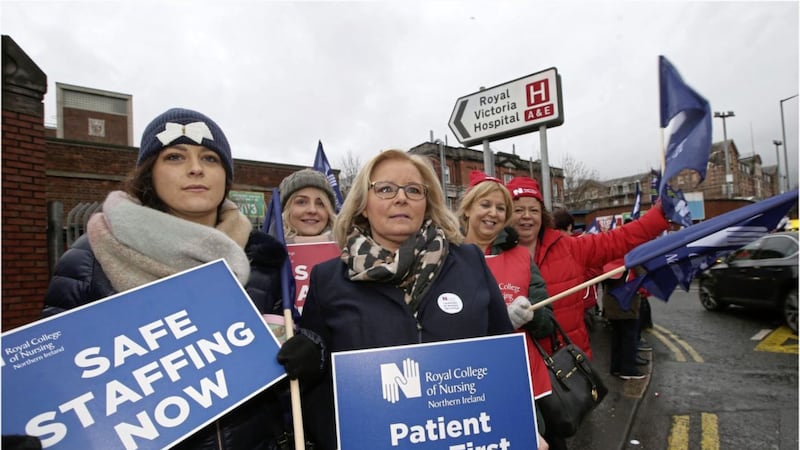THE head of Northern Ireland's biggest nursing trade union has called for "safe staffing" legislation to be urgently brought forward after a report exposed "shocking" levels of spending on agency workers to plug shortages.
Pat Cullen, director of the Royal College of Nursing (RCN), claimed the north's health service wouldn't find itself in the "mess" it's currently facing if laws had been in place to ensure proper staffing ratios in hospitals and the community.
The union chief, who led thousands of her members out in unprecedented strike action earlier this year, said an audit report released yesterday highlighted the same concerns that resulted in nurses taking to picket lines.
In a detailed examination of workforce planning for the nursing and midwifery sector, auditors discovered successive cuts by the Department of Health to undergraduate places at a time of increased patient demand led to a 150 per cent hike in the bill for 'temporary' staff over a seven-year period - from £45m in 2011/12 to £115m in 2018/19.
During bank holidays last year, three health trusts were forced to pay private recruitment agencies up to £1,700 to cover single nursing shifts.
It also found that 2,700 nursing posts were lying empty, despite repeated recruitment campaigns at home and abroad.
Ms Cullen said: "Put simply, we do not currently have the right number of nurses to provide all of the care that the people of Northern Ireland need and deserve.
"This report makes it clear that for far too long, workforce planning for nursing has been driven by short-term financial considerations resulting in nursing posts and pre-registration nursing student places being cut.
"As we warned at the time, this has resulted in using much more expensive temporary staff from internal banks and external agencies to cover the gaps. Some of the costs are shocking.
"As the report suggests, the short-term decisions that were taken have created a much larger problem that will take longer to resolve.
"This is one of the reasons why it is so important that we have safe nurse staffing legislation implemented in Northern Ireland as soon as possible.
"If there had been legislation when these decisions were taken, we wouldn’t have ended up in the mess we are in now, which will cost much more to rectify."
Strike action ended in January after the newly-appointed health minster Robin Swann agreed to bring nurses' and other healthcare workers pay into line with their NHS counterparts in Britain.
A deal was also hammered out around a new safe staffing framework document.
While the RCN welcomed this move, Ms Cullen said it will take several years before a more stable workforce is established and warned that more than a third of it members surveyed were considering leaving their job due to poor staffing and pay.
"Work on safe nurse staffing legislation must begin now. We simply cannot afford for this to happen again," she said.
"Nurses have rightly been recognised for their unprecedented contribution during this pandemic. Now is the time to ensure that this recognition translates into action –that includes ensuring we have the right numbers of nurses in the right places – and that nurses are properly rewarded, and treated equally, to similar professions."








